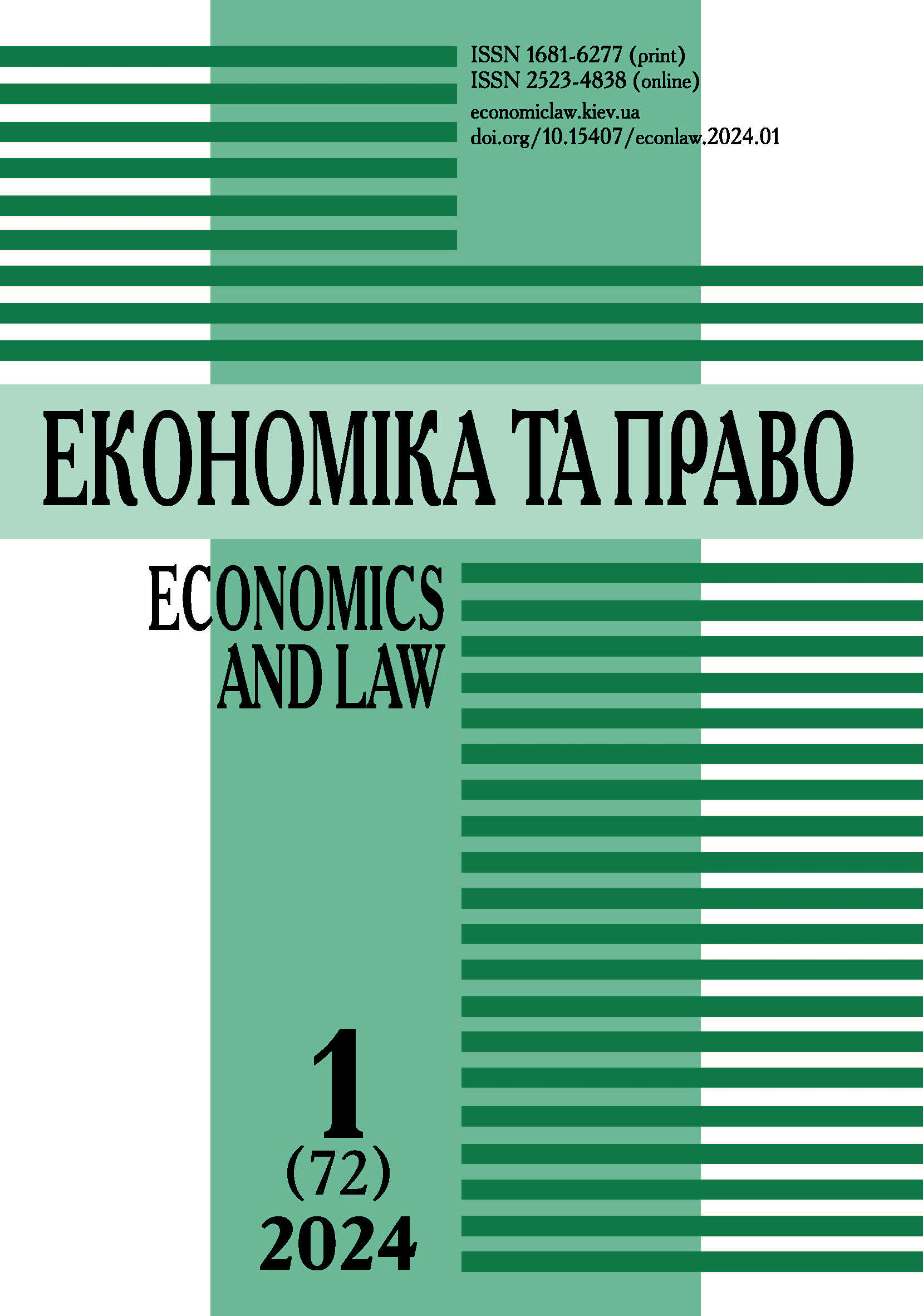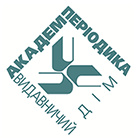EXTRAJUDICIAL PROTECTION OF THE RIGHTS OF ECONOMIC ENTITIES AND ITS IMPORTANCE IN MODERN CONDITIONS
Abstract
The author supports the position that the protection of the rights of economic entities is a system of measures (forms and methods of activity) that are carried out in accordance with the law, both by the economic entity independently and through authorized persons, and are aimed at preventing and eliminating threats of rights violations relevant entities, removing obstacles to the exercise of these rights, restoring violated rights and legal status, and bringing violators to justice. The research showed that the division of forms of protection of economic entities into: 1) pre-trial, 2) extra-judicial, 3) judicial has found support in the scientific literature. However, the majority of modern scientists support the position regarding the existence of two main types of such forms: non-jurisdictional and jurisdictional. It is noted that extrajudicial or non-judicial protection of the rights of economic entities is a separate form of rights protection, which has its own characteristics and occupies a valid place in the system of forms of protection of the rights of economic entities. In addition, in most countries of the world there is “alternative resolution of legal disputes”, as a set of techniques and methods of out-of-court settlement of disputes, the result of which is an agreement between the parties of disputes. According to scientists, the fate of such dispute resolution in the ountries of the European Union is 70 % of disputes in the field of private law. Thus, summarizing the opinions in the scientific literature and analyzing the practical aspects of the protection of the rights of economic entities, it is possible to determine that the outof- court protection of the rights of economic entities is a system of actions (forms and methods of activity) that are carried out without going to court, in accordance with the law and/or terms of the deed, both by the economic entity independently, including through authorized persons, and with an appeal to competent state and non-state bodies (except the court) and/or entities authorized to perform certain actions or consider issues (disputes), and which are aimed at preventing violations, eliminating threats and obstacles to the exercise of the rights of economic entities, stopping the violation of rights, restoring or establishing the violated rights and legal status, as well as bringing violators to justice. The research shows that in the scientific literature and current legislation there are several groups of forms and methods of extrajudicial protection of the rights of economic entities, namely: 1) self-defence, which can be defined as the actions of a person, carried out independently to prevent violations, protect and restore their rights and interests; 2) administrative protection, which is carried out by bodies of state power, local self-government, institutions endowed with relevant powers; 3) notarial protection is the protection of the rights of economic entities carried out by a notary during or by performing notarial actions provided for by current legislation; 4) arbitration protection involves applying to an arbitration court – a non-state independent body formed by agreement or relevant decision of interested individuals and/or legal entities in the manner established by this law, to resolve disputes arising from civil and economic legal relations; 5) mediation – an out-of-court voluntary, confidential, structured procedure, during which the parties, with the help of a mediator(s), try to prevent the occurrence or settle a conflict (dispute) through negotiations; other types provided for by separate legislative acts and contracts between economic entities, which, first of all, can include the use of means of ensuring the fulfilment of obligations, including extrajudicial foreclosure on pledged property/subject of mortgage, etc. It was noted that extrajudicial methods, as a rule, allow protection of the rights of economic entities with time and cost savings, and also contribute to the preservation of economic legal relations for the future. According to the author, among the advantages of out-of-court protection of the rights of economic entities, the following may be highlighted: saving time or speed of resolving misunderstandings (disputes) between participants in economic legal relations; cost savings; the possibility of preserving relations, economic ties between the participants of legal relations, continuation of economic interaction; preservation of confidentiality regarding information about the participants of the legal relationship themselves, about their mutual relations, as well as about the violations committed by them; the presence of the consent of the parties to a certain settlement of the dispute, which in turn provides time and cost savings and other implementations of other advantages; flexibility of the process of protection, restoration of rights, the possibility to negotiate in the process of implementation of rights protection; ensuring the distribution of responsibility between the parties, and decisions based on the results are aimed at meeting the requirements of both parties; ensuring the independence and impartiality of the arbitrator, who is chosen by both parties; reducing the burden on the court and decision enforcement bodies. The article also highlights the shortcomings of extrajudicial protection, which should be identified: lack of a clear mechanism, procedure, traditions or clearly defined conditions of application; the possibility of delaying the process by the participants of the legal relationship themselves, delaying the prosecution of the guilty party; optionality of some decisions and actions for the parties when implementing extrajudicial means of protection; impossibility to fully implement protection, to complete the removal of obstacles to the exercise of rights or the restoration of violated rights without resorting to other forms and methods of protection, for example, to court or enforcement of a decision. Elimination of the existing normatively established “hard list” of operational and economic sanctions can be carried out by means of provisions in Art. 236 of the Economic Code of Ukraine of a separate rule stating that the parties to economic contracts have the right (or are not deprived of such a right) to provide in the economic contract for any other operative economic sanctions not directly provided for by any laws and regulations, but the content, conditions and procedure of application should not contradict the norms of the legislation of Ukraine and/or violate them.
Keywords
protection of rights, extrajudicial protection, economic entity, violation of rights, forms of protection of rights, methods of protection of rights, jurisdictional forms of protection, non-jurisdictional forms of protection
Downloads
References
2. Petrunia V.V. Poniattia ta systema sposobiv zakhystu prav subiektiv hospodariuvannia: avtoref. dys. … kand. yuryd. nauk: 12.00.04. Nats. un-t “Odeska yurydychna akademiia”. Odesa, 2019. 21 p. [in Ukrainian].
3. Marchenko V. Shchodo pytannia zdiisnennia notariusom zakhystu subiektyvnykh tsyvilnykh prav. Pidpryiemnytstvo, hospodarstvo i pravo. 2020. No. 3. P. 31-35. https://doi.org/10.32849/2663-5313/2020.3.06 [in Ukrainian].
4. Lavrin O. Zakhyst prav subiektiv hospodariuvannia, yoho formy ta sposoby. Pidpryiemnytstvo, hospodarstvo i pravo. 2002. No. 11. P. 56-60 [in Ukrainian].
5. Naukovo-praktychnyi komentar Hospodarskoho kodeksu Ukrainy / za zah. red. V.K. Mamutova. Kyiv: Yurinkom Inter, 2004. 687 p. [in Ukrainian].
6. Neiurysdyktsiini formy zakhystu prav ta interesiv subiektiv hospodariuvannia / za zah. red. M.S. Dolynskoi. Lviv: Halytska vydavnycha spilka, 2020. 174 p. [in Ukrainian].
7. Pravove rehuliuvannia hospodarskoi diialnosti: Navchalnyi posibnyk / za zah. red. V.V. Machuskoho. Kyiv: KNEU, 2015. 152 p. [in Ukrainian].
8. Matiashchuk D.S. Formy zaxystu prav ta interesiv subiektiv hospodariuvannia. Stratehii pidpryiemnytskoi diialnosti v interesakh staloho rozvytku maloho i serednoho innovatsiinoho pidpryiemnytstva: zb. nauk. pr. NDI PZIR NAPrN Ukrainy za materialamy II kruhloho stolu (16 lystop. 2020 roku). Kharkiv: NDI PZIR NAPrN Ukrainy, 2020. P. 65- 69 [in Ukrainian].
9. Levchenko M.Iu. Deiaki aspekty dosudovykh ta pozasudovykh mekhanizmiv zakhystu prav ta interesiv pidpryiemtsiv. URL: https://conf.ztu.edu.ua/wp-content/uploads/2021/10/102.pdf [in Ukrainian].
10. Didenko L.V. Spivvidnoshennia sudovykh ta pozasudovykh sposobiv zakhystu tsyvilnykh prav. Visnyk Zaporizkoho natsionalnoho universytetu. Yurydychni nauky. 2020. No. 3. P. 44-49. https://doi.org/10.26661/2616-9444-2020-3-06 [in Ukrainian].
11. Prytyka Yu.D. Teoretychni problemy zakhystu prav uchasnykiv tsyvilnykh pravovidnosyn v treteiskomu sudi: avtoref. dys. … d-ra yuryd. nauk: 12.00.03. Kyiv. nats. un-t im. T. Shevchenka. Kyiv, 2006. 26 p. [in Ukrainian].
12. Nikolenko L.M. Zakhyst prav ta interesiv subiektiv hospodariuvannia v umovakh reformuvannia zakonodavstva. Ekonomika ta pravo. No. 2 (47). 2017. P. 19-24. https://doi.org/10.15407/econlaw.2017.02.019 [in Ukrainian].
Abstract views: 327 PDF Downloads: 223

This work is licensed under a Creative Commons Attribution 4.0 International License.









